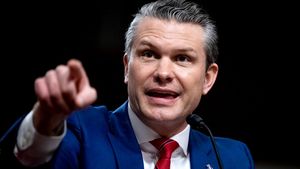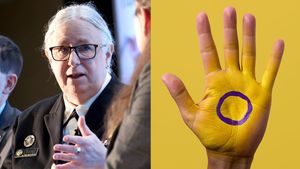
Treatment GuideJust DiagnosedSex & DatingAfrican AmericanStigmaAsk the HIV DocPrEP En EspañolNewsVoicesPrint IssueVideoOut 100
CONTACTCAREER OPPORTUNITIESADVERTISE WITH USPRIVACY POLICYPRIVACY PREFERENCESTERMS OF USELEGAL NOTICE
© 2025 Pride Publishing Inc.
All Rights reserved
All Rights reserved
By continuing to use our site, you agree to our Private Policy and Terms of Use.
Georgina Gomez is no stranger to the stigma that surrounds HIV. Her brother-in-law, Javier, has been HIV-positive for more than 20 years, giving her a ringside seat to observe the fears and prejudices this disease can evoke. Even so, Gomez says she never could have predicted the obstacles her family would encounter when Javier needed to be placed in a skilled nursing facility after he was discharged from the hospital earlier this year. In short, virtually no facility would take him. That's how Gomez came to learn what far too many hospital discharge planners and AIDS treatment advocates have known for years: Without compunction, skilled nursing facilities continue to turn away people with HIV. 'There is a high prevalence of blatant discrimination,' says Brad Sears, a law professor at the University of California, Los Angeles. How high? Sears, who directs the Williams Institute, a UCLA School of Law think tank on sexual orientation law and public policy, oversaw a two-year study on HIV discrimination in health care in Los Angeles County. As part of the investigation two law students posed as discharge planners and called 131 Los Angeles'area skilled nursing facilities, asking a series of questions about their admissions policies. The result: When asked if they would take a patient with HIV, 46% of the respondents flat-out said no. Some of the admissions officers offered various rationales, such as they took only elderly patients, their facility didn't have HIV protocols, or their staff wasn't appropriately trained. But regardless of their justification, says Sears, 'they were all ignorant about what state and federal disability law requires': that no health care provider have a blanket policy of refusing services to people with HIV. None of this is news to Jim Chud. Over the past eight years Chud, a long-term survivor, has had multiple surgeries to fight an HIV-related fungal infection in his brain and to fuse different portions of his spine. (The cartilage in Chud's spine is dissolving, a side effect of a medication he received in an HIV clinical trial in 1987.) The most recent go-round left him with a gaping wound in his back that has stubbornly refused to heal. As a result, Chud has been hospitalized at Cedars-Sinai Medical Center in Los Angeles since April 14. In the past Chud wouldn't have been forced to spend months on end at Cedars-Sinai. Instead, he would have been discharged to Carl Bean House, the hospice and skilled nursing facility that the AIDS Healthcare Foundation opened in 1992. But in February 2006, AHF was forced to close Carl Bean's doors when the Los Angeles County board of supervisors slashed its funding. The Epidemic Evolves Part of the problem--which is actually good news--is that the need for hospice beds and skilled nursing facilities is not what it was in the 1980s and 1990s, when the U.S. death rate from AIDS soared. But the downside is that people who need long-term care often have a hard time finding it. Judy Iwanier has been a discharge planner at Cedars-Sinai Medical Center for more than eight years. During that time, she says, she's seen the options dwindle for the HIV-positive patients she needs to place. 'Few skilled nursing facilities say it outright anymore,' says Iwanier, 'but they still won't take these patients. If they say they can't take care of the patient's needs because they do not have [a registered nurse] 24 hours and the patient needs medications around the clock, I know they are telling me the truth.' But there are other times, she says, when 'I know the answer is no solely because they don't want someone with HIV.' This problem is not unique to Los Angeles. Only a handful of cities throughout the country have skilled nursing facilities specifically for people with HIV. This means that hundreds of discharge planners nationwide undoubtedly have had experiences similar to Iwanier's. The precise scope of the problem, though, remains unknown. The first and last Health and Human Services report highlighting HIV discrimination in skilled nursing facilities was released in 1993. Changing With the Times The HIV-specific facilities that are still open have had to adapt to changes in the population in need of care. 'In the first seven years we were open we had a death a day and the average length of stay was 30 days,' says Brian Knowles, executive director of Bailey-Boushay House, which opened in Seattle in 1992. Today, Bailey-Boushay, which is run by Virginia Mason Medical Center, continues to serve more than 200 people a year. 'But now,' Knowles says, 'the average length of stay is 90 days and most people leave.' Furthermore, Bailey-Boushay's resident population includes not only patients who need postsurgical care or who have AIDS-related illnesses but also people who need intensive support while getting their HIV infection under control. Directors of skilled nursing facilities specifically for HIVers suggest there may be a number of reasons why other facilities turn people away. They don't doubt that fear and prejudice exist. But what also can't be overlooked, they say, are the ways in which HIV patients differ from the typical elderly and frail nursing home resident. 'A person with HIV is not 'your garden-variety person in a skilled nursing home,' says John R. Brechtl, associate medical director at Terence Cardinal Cooke Health Care Center, a skilled nursing facility in New York City that opened an HIV unit in 1989. As Brechtl explains, HIV patients tend to be younger, which means they need different activities. They are on many more medications, some of which are typically time- or food-sensitive, and that means they require 24-hour nursing care. In addition, those people now in need of care often have a history of drug addiction or mental health problems, which requires staff familiar with such psychosocial issues. The Bucks Stop Here All of this affects the bottom line: cost. Many HIVers have Medicare or Medicaid, and not all facilities will take people enrolled in these state and federal programs. Both Medicare and Medicaid pay nursing facilities a daily rate for a patient's care. And while that rate might be adequate to cover the staffing and medication needs of a typical resident, it often falls short of what is needed to care for an individual with HIV. This means, Knowles says, that a facility can lose money if it takes in someone with HIV. It's also why it's no coincidence that all of the skilled nursing facilities specifically for HIVers exist in states that have agreed to provide them an enhanced Medicaid rate as well as a 'pass through' for medication costs. This places advocates for HIVers in the position of fighting discrimination in skilled nursing care while recognizing that patients will undoubtedly do better in homes that have experience with and want to treat these patients. 'I know that many people believe--from a policy point of view--that no matter where someone goes, they should be able to get the care they need,' says Martha Dale, executive director of Leeway, Connecticut's only freestanding nursing home for people with HIV. 'But there really is value in going to some place that provides care day in and day out for this illness and really understands it.' Ultimately, Javier was accepted into a skilled nursing facility. But it was far from Gomez's home, making it difficult for her to visit or to take him to his doctor appointments. In addition, she says, it was dark, depressing, and smelled horrible. As a result, by the end of June, Gomez was interviewing nurses who could care for Javier in his own home. 'One of the nursing assistants at the facility asked me if I was sure I was doing the right thing by taking him home,' she says. 'He hates it there. There is nowhere for him to go and nothing for him to do.' Chud, in turn, at press time had spent at least three months working the phones from his hospital bed, trying to draw attention to the need for skilled nursing care for HIVers. 'I think right now that the people who need care are just the tip of the iceberg,' he says. 'As the population with HIV ages, there are going to be more people like me coming down the pike'--people who have HIV-related illnesses or other problems that require long-term care. 'No one is talking about the fact,' he stresses, 'that there's no place for people like us to go.'
From our Sponsors
Most Popular
Why activist Raif Derrazi thinks his HIV diagnosis is a gift
September 17 2024 12:00 PM
How fitness coach Tyriek Taylor reclaims his power from HIV with self-commitment
September 19 2024 12:00 PM
Out100 Honoree Tony Valenzuela thanks queer and trans communities for support in his HIV journey
September 18 2024 12:00 PM
Creator and host Karl Schmid fights HIV stigma with knowledge
September 12 2024 12:03 PM
The freedom of disclosure: David Anzuelo's journey through HIV, art, and advocacy
August 02 2024 12:21 PM
From ‘The Real World’ to real life: How Danny Roberts thrives with HIV
July 31 2024 5:23 PM
Eureka is taking a break from competing on 'Drag Race' following 'CVTW' elimination
August 20 2024 12:21 PM
California confirms first case of even more deadly mpox strain
November 18 2024 3:02 PM
Plus: Featured Video
Latest Stories
A camp for HIV-positive kids is for sale. Here's why its founder is celebrating
January 02 2025 12:21 PM
This long-term HIV survivor says testosterone therapy helped save his life.
December 16 2024 8:00 PM
'RuPaul's Drag Race' star Trinity K Bonet quietly comes out trans
December 15 2024 6:27 PM
Ricky Martin delivers showstopping performance for 2024 World AIDS Day
December 05 2024 12:08 PM
AIDS Memorial Quilt displayed at White House for the first time
December 02 2024 1:21 PM
Decades of progress, uniting to fight HIV/AIDS
December 01 2024 12:30 PM
Hollywood must do better on HIV representation
December 01 2024 9:00 AM
Climate change is disrupting access to HIV treatment
November 25 2024 11:05 AM
Post-election blues? Some advice from mental health experts
November 08 2024 12:36 PM
Check out our 2024 year-end issue!
October 28 2024 2:08 PM
Meet our Health Hero of the Year, Armonté Butler
October 21 2024 12:53 PM
AIDS/LifeCycle is ending after more than 30 years
October 17 2024 12:40 PM
Twice-yearly injectable lenacapavir, an HIV-prevention drug, reduces risk by 96%
October 15 2024 5:03 PM
Kentucky bans conversion therapy for youth as Gov. Andy Beshear signs 'monumental' order
September 18 2024 11:13 AM
Study finds use of puberty blockers safe and reversible, countering anti-trans accusations
September 11 2024 1:11 PM
Latinx health tips / Consejos de salud para latinos (in English & en espanol)
September 10 2024 4:29 PM
The Trevor Project receives $5M grant to support LGBTQ+ youth mental health in rural Midwest (exclusive)
September 03 2024 9:30 AM
Introducing 'Health PLUS Wellness': The Latinx Issue!
August 30 2024 3:06 PM
La ciencia detrás de U=U ha estado liberando a las personas con VIH durante años
August 23 2024 2:48 PM














































































